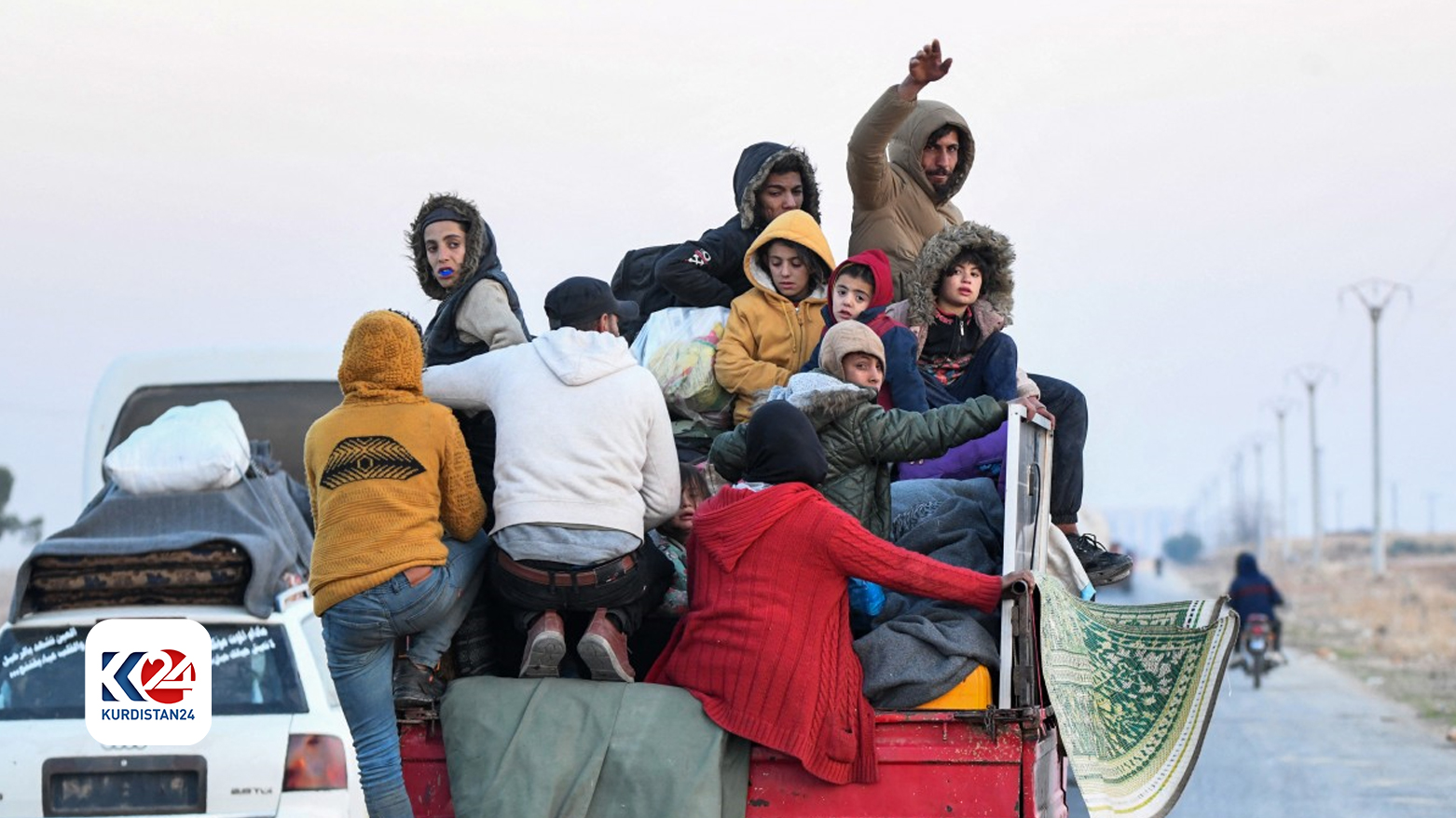Kurdish civilians flee as Syrian conflict escalates in Aleppo, Tall Rifat
It is reported that approximately 200,000 Kurds have been displaced so far.

Dec. 3, 2024
ERBIL (Kurdistan24) – Following the attacks by the armed militia groups in Syria controlling the city of Tall Rifat, and the retreat of Syrian Democratic Forces (SDF), the Kurdish residents of the city found themselves in a bitterly familiar situation. As the militias advanced into the city and its surrounding areas, exodus and displacement gripped the Kurdish residents of both Tall Rifat and Shahba.
It is reported that approximately 200,000 Kurds have been displaced so far.
An official of the Autonomous Administration has informed the Agence-France Presse (AFP) that following the Turkish-backed armed groups’ takeover of Tall Rifat and the villages of the Shahba area, the Kurdish residents of those areas were forced to flee from their homes.
As the official disclosed, a group of displaced Kurds have arrived at the areas controlled by SDF.
The Syrian Democratic Forces (SDF) also declared that they will “attempt to move the displaced Kurds from Aleppo and its surroundings to areas under SDF’s control.”
In order to protect themselves from the ongoing clashes between pro-government forces and the Turkish-backed armed groups, chief among them Hayat Tahrir al-Sham (HTS), the Kurdish locals of Aleppo and its vicinity decided to seek refuge in SDF-controlled areas.
SDF has pledged to “safely transfer all of them.”
Regarding the displacement of the Kurds of Aleppo governorate, the spokesperson of Syrian Democratic Forces Farhad Shami stated, “A portion of the displaced persons have safely arrived in a convoy of more than 100 vehicles to the township of Tabqa.”
Previously, Mazlum Abdi, the head of Syrian Democratic Forces, had announced that “SDF is attempting to transfer the displaced Kurds of Tall Rifat and a portion of Aleppo Kurds to the areas controlled by them in Eastern Syria.”
At the same announcement, Abdi added that “the situation in the northwestern regions of Syria is changing, and has changed, rapidly and unpredictably. Our forces have encountered fierce attacks from multiple fronts.”
“Following the defeat of the Syrian Regime’s Army, we were able to create a humanitarian corridor through areas under our control in Aleppo and Tall Rifat. However, after attacks by the Turkish-backed militias, this corridor is disrupted,” Abdi stressed.
Mazlum Abdi seemed to be defiant and declared that the SDF would continue to provide safety and defend the Kurds of the Aleppo governorate.
The situation in northern Syria witnessed rapid escalations on Saturday, Nov. 30 when the Turkish-backed armed groups, led by Hayat Tahrir al-Sham and its allies, quickly gained control over areas around Aleppo.
The armed groups were eventually successful to enter into the city following the retreat of the Syrian Regime’s Army.
For a while, it was reported that Syrian Democratic Forces had also moved to control some areas in Aleppo, chief among them the International Airport. However, soon SDF decided to withdraw and regroup.
This gave the opportunity to the armed groups to gain full control of the city.
The Syrian Army and Defense Ministry have repeatedly announced their preparations for a counter-offensive to regain control of the city.
The unfolding events and the ensuing fierce conflicts resulted in regional and global reactions and requests for immediate ceasefire and de-escalation.
On Sunday, the UN Resident Coordinator and Humanitarian Coordinator for Syria Adam Abdelmoula issued a statement regarding the recent escalation of hostilities in Northern Syria and Aleppo, urging to “immediately cease hostilities and prioritize the protection of civilians.”
Read More: UN urges immediate ceasefire in Syria
Later on, a joint statement by the United States, Germany, France, and the UK was issued on Sunday, Dec. 1, urging for de-escalation, conflict’s cessation between pro-government and opposition forces, and the protection of civilians and civilian infrastructure.
Read More: West urges de-escalation in Syria
The reactions from both Damascus and Ankara were also important to note. Syrian President Bashar al-Assad labeled the militia takeover of Aleppo as “an act of terrorism”. Meanwhile, Turkish President Recep Tayyip Erdogan said, "Our greatest wish is for Syria's territorial integrity and national unity to be preserved, and for the instability that has been going on for 13 years to end with consensus in line with the legitimate demands of the Syrian people."
The Syrian President, following the shock rebel offensive on Aleppo, was quick to shore up support from his allies, chief among them Russia and Iran.
Iran’s Foreign Minister Abbas Araghchi traveled to Damascus as a gesture of support to the Assad regime and declared his country’s full backing of the Syrian government and army, according to the Iranian state media.
Russia’s position on the unfolding events has been curiously ambiguous. Already engaged in another conflict in Ukraine, the Kremlin said on Monday that Russia will continue to support President Assad following the loss of Aleppo to Islamist insurgents, Reuters reported.
The joint airstrike by both Russian and Syrian aircraft stands as a symbol of Moscow’s backing of the Syrian government. Russian support has been a major factor behind the Syrian Regime surviving years of internal conflicts.
Regarding the events in Syria, Kremlin Spokesperson Dmitry Peskov stated: “We continue to support Bashar Al-Assad. Contacts are continuing at the appropriate levels. We are analysing the situation and a position will be formed on what is needed to stabilise the situation.”